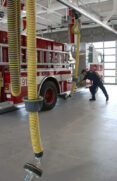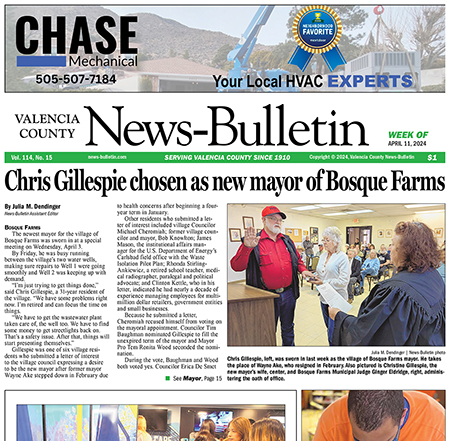Public bodies buy everything from toilet paper to backhoes and build community centers and libraries.
While most people can just buy toilet paper from any retailer, it’s a little more complicated for a government body.
When a city or school district makes a purchase, the money doesn’t come out of someone’s personal bank account; it comes from the taxpayers.
“We need to make sure we are spending taxpayers money wisely, by getting quality items, hiring qualified companies, that have the necessary equipment, that are licensed and bonded, insured, that are actual businesses,” said Roseann Peralta, finance director and certified purchasing officer for the city of Belen.
There are two basic types of government purchases — an invitation to bid and a request for proposals. The bid process is typically used when a public body is seeking a specific piece of equipment, such as a road grader, Peralta said.

TFC Construction won the bid a few years ago for the Veterans Memorial in Belen.
“We will put together the specifications for the equipment and advertise that we’re looking to buy a new road grader,” she said. “We get bids and they are sealed; there’s no negotiation, no comparison. Whoever has the lowest price is who we buy from.”
Some projects are also put out for bid, she said, such as a paving project that has been fully engineered and the specifications, such as the length, width and thickness of the asphalt is known.
Services on the other hand, like hiring an attorney for the city, usually goes through a request for proposal process. In an RFP process, the governing body puts together a description of the services it wants.
“So for an attorney, let’s say we want someone who is familiar with municipal government, tort claims and personnel issues,” she said. “Firms submit their proposals, which does include a cost component, and the proposals are evaluated and scored.”
If an entity uses an RFP process, the evaluation criteria and scoring system is made known to the public and potential offerors.
“The last RFP we did for an attorney, we had three very good attorneys but two of them had little government experience, so they didn’t score as well,” Peralta said. “That’s not to say they aren’t good attorneys, they just didn’t have the experience the city wanted.”

When a government body awards a contract for a job, there are often multiple steps and items delivered, such as this conceptual site plan for the town of Peralta’s community center. This is just one step of many before the building is constructed.
When a contract for a service or project is awarded, there can often be criticism if the company isn’t local, which isn’t necessarily the first priority of government purchasing and procurement offices.
“Our first priority is to get the best obtainable price so that taxpayer’s money is used well,” Peralta said.
Buying from local vendors is something the city tries to do, Peralta said, but sometimes equipment and tools aren’t available or the quality isn’t up to par.
“If we buy a $10 shovel that breaks every couple of weeks, it’s going to cost more in money and time than if we go outside the city limits and get a $15 shovel that will last months, for example,” she said.
The complexity of a project also comes into play when selecting the proper contractor.
For instance, if the city needs to replace a water line, more often than not, part of the street will need to be removed and repaved, and possibly nearby concrete work torn up and replaced.
“We want a company that has all the equipment to dig up the road, replace the line, repave the road and redo the sidewalks, all within their company and their employees,” she said. “If we go with just whoever is nearby, they might know how to replace a water line but their bid is going to have to include subcontractors for the asphalt and cement work.
“That is typically going to bring the price up and might extend the time line. On some projects, we can’t wait weeks.”
Public bodies also have the option of using what’s called a state contract, through the New Mexico General Services Department state price agreements.
The department goes through a procurement process similar to the one done by local governments. Fleet vehicles are a common item purchased through a state contract. The state puts out the specifications for vans, cars and trucks and dealers across the state submit their proposals.
Currently there are eight dealerships with statewide price agreements, including Melloy in Los Lunas.
“We, as a municipality, can go through that contract and get that pricing because the state has already negotiated the best price,” Peralta said. “Typically we can find a dealer that has what we need on the lot and we don’t have to wait and go through the bid process ourselves. This helps us save money and time.”
The state has price agreements for a number of items, such as cleaning supplies and ammunition for law enforcement that municipalities and other government bodies purchase.

The new Los Lunas fire station was completed in 2018.
There are usually numerous vendors for the different categories, Peralta said, and vendors can submit a proposal to be on state contract. The General Services Department will put out an RFP every year or two, seeking vendors for various supplies and equipment.
When an agency handles the procurement itself, it must advertise the opportunity to bid or RFP and usually does so in local newspapers, industry trade publications, on its website and lately, even on social media, Peralta said.
“Depending on the type of project or item we’re looking for, it can take anywhere from a month and a half to three months,” she said. “With larger projects, we have pre-bid meetings, where vendors can come and ask questions. Then we have to answer those questions and send them back to everyone.
“Once we put out a bid or RFP, vendors send back an affidavit of acknowledgement saying they are interested in the job. Going forward, any questions and answers are sent out to everyone to be fair. Then they put their bid or proposal together and send them to us.”
After that, the bids or proposals are reviewed and a vendor is selected. Pre-construction meetings follow, timelines are laid out and eventually work begins.
“A lot of these projects aren’t a simple as they seem,” Peralta said. “Our goal is to get quality products, projects done by qualified companies, that are going to make good use of the taxpayer’s money.”
The Valencia County News-Bulletin is a locally owned and operated community newspaper, dedicated to serving Valencia County since 1910 through the highest journalistic and professional business standards. The VCNB is published weekly on Thursdays, including holidays both in print and online.
















